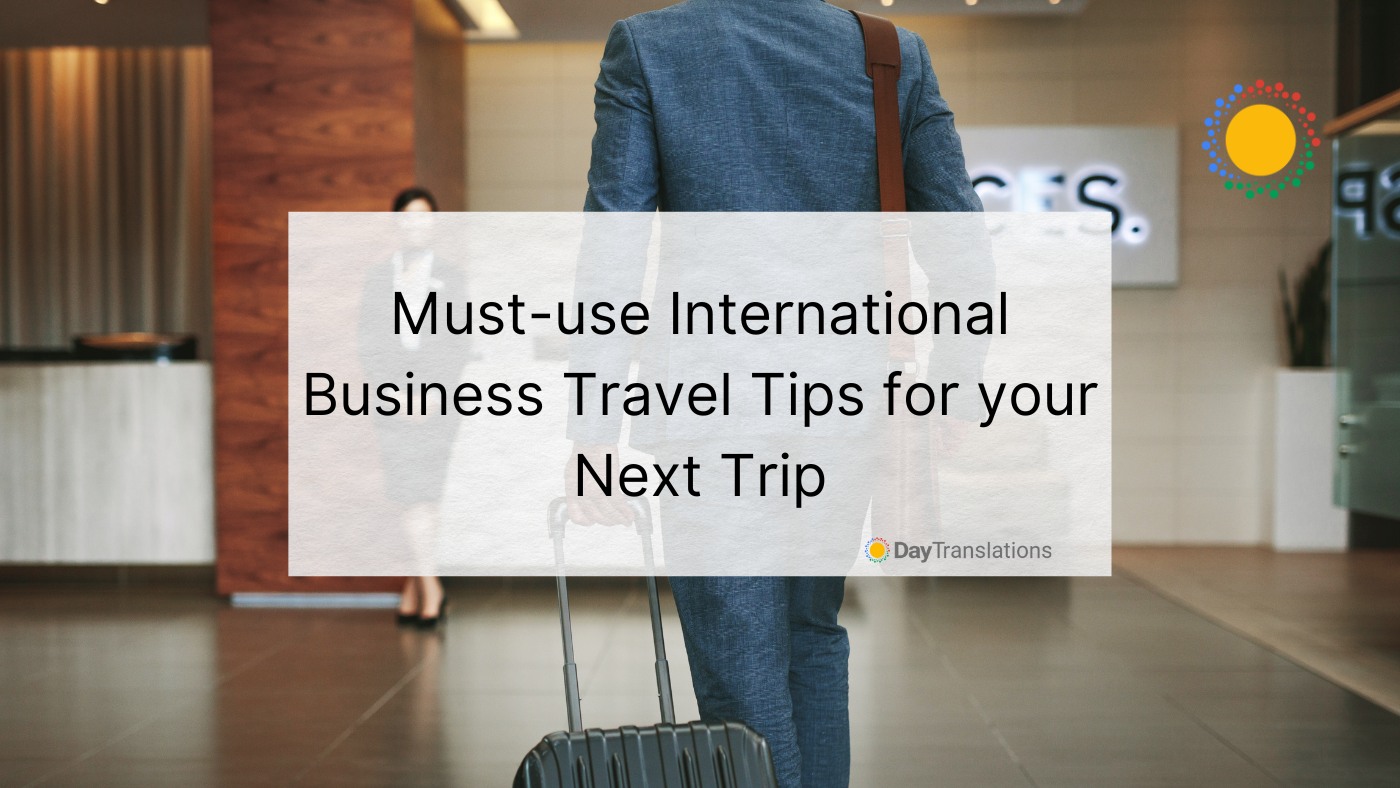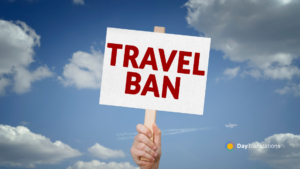International business travel – it can be an opportunity to see a new locale and expand your horizons, yet the list to prepare is not quite the same as going from California to New York. International travel has a different set of challenges – some you might not even have anticipated. For example, language barriers, cultural differences, odd-shaped plugs, and different currency. Read about our international business travel tips below to make the trip as smooth as molasses.
ALL THINGS PHONE AND COMMUNICATION
Phones are mainstays to our modern life, even more so when traveling internationally and our surroundings are unfamiliar. With that in mind, it’s better to err on the side of being over prepared when it comes to technology. Nothing like a dead phone or malfunctioning technology to unnerve you!
Before you go on your trip, call your cell phone company to ask them about the service where you’ll be going. Will there be a GPS and Wifi connection? When I travel internationally, it’s critical for me to have a map and GPS tells me how to get to my destination. Sometimes you’ll only have internet where there is Wifi (and not the typical omnipresent Wifi you’re probably used to), so take a screenshot of the directions and the map before you go out of the Wifi range.
While you’re on the phone with the cell phone company, ask about roaming charges and see if there’s a cheap additional monthly plan for international trips. Paying that extra $5-$15 for the month will most definitely beat potential roaming charges. If you don’t spring for the international plan, make sure to turn roaming OFF or put the phone on airplane mode. A friend went on a business trip for a week and returned with hundreds of dollars of charges on his personal phone bill because it was constantly roaming during the trip.
If you’re getting charged for every text message, those can add up, as well. So ask your friends or family to take you off the group text while you’re abroad. You can catch up with them when you get back or use WhatsApp video calls to see what you’ve missed.
Pack at least two phone chargers, as you might not be able to buy your specific phone charger in the country you’re traveling to. If you’re anything like me, you might lose 1, so having two is crucial. It’s critical that you’re able to use your phone, even if you’ve lost one charger. Make sure to buy it before you get to the airport to save money, although we’re guilty of having to buy the airport-priced chargers when push came to shove. It’s better than getting stuck without a cell phone though.
A portable charger is also a good idea. We always seem to have a 20% battery left when we land. So instead of running to the nearest outlet next to the baggage claim, desperate to hail your Uber before the phone dies, chillax with your portable charger. We like this one. Make sure the charger is off when not using it, or you’ll end up like us: with a dead cell phone and a dead portable charger. Totally pointless! Oh, and don’t forget to charge the portable charger during the night!
CLOTHING COMFORT
Pack an extra set of clothing in your carry-on bag, especially a business outfit, if you have a meeting soon after landing. This will help you avoid showing up in shorts and your comfy “flying” sweater. If your travel day is just a travel day, and no business will be done, you can dress more casually, but keep it presentable. Wear layers to accommodate temperature fluctuations in the airports, on the plane and the weather of your destination. Dark jeans, a pashmina or cozy wrap for women, and some slip-on loafer-type shoes are safe bets. I also pack socks in my carry-on, because the plane always seems to be freezing for me.
Since no one likes the “sitting for 10 hours on an airplane” smell, bring a small toiletry bag with mints, a toothbrush and deodorant in order to freshen up before landing. It’s also helpful if your luggage is misplaced or delayed.
ACCOMMODATIONS: Airbnb versus Hotel
If you’re a smaller business and want to save money, or simply want to feel at home during an extended stay, we love Airbnb apartments. You feel like you truly live there, and you also have a kitchen to store leftovers and make meals at home. It’s also great if you have special dietary restrictions and need to be careful about eating out. This can save money on overall food expenses, especially if you’ll be abroad for a few weeks, and sometimes it can save money on the room but not always. Some hotels will pick you up at the airport, saving you the taxi costs, which can run $50-$80+ one way in most major cities. So make sure to do the math if you’re looking to get employee of the month for your savings savvy.
If you’re traveling abroad for a conference, you might want to consider staying at the hotel for convenience. With each conference, you have to weigh the options and the distance. Will it be more of a hassle than it’s worth to stay farther away? Will I miss out on late night drinks with conference attendees that could score great business deals and improve relationships? It really depends. Our last conference in Munich would have been $200 plus tax per night to stay at the conference hotel ($800 for 4 nights), but we chose a 10-minute walk to a nearby apartment ($400 for 4 nights), and we still stayed at the hotel drinking and networking with everyone until midnight. We just had a slightly longer walk at midnight which we didn’t mind (but some employees might, so keep that in mind and make sure everyone is happy). If you’re trying to calculate your per diem allowance for business travel expenses, you may want to check out this per diem rate calculator developed by TravelPerk. It can help you determine the daily allowance you’ll receive for meals, accommodation, and other expenses that you may have based on your destination and the time of year.
With an Airbnb rental, make sure to check what amenities are included, as well. Never assume! I had previously thought they all came with shampoo, conditioner, and body soap, but when I got to Montreal, I was wrong. So now I always check that shower amenities will come with my room or apartment. The last thing I want to do is lug around tiny bottles of liquid in my suitcase or have to find where to buy them the first day in the new country.
Once you’ve arrived at either your hotel or Airbnb, make sure to leave your passport in the room in a hidden place. Don’t walk around with it unless you absolutely need to. The goal is to NOT lose your passport while exploring your destination. Best to leave it in your room so it is safe for your return trip.
Electrical outlets are often different depending on where you’re traveling so pack two adaptors. Check your voltage before you go, like your computer and your cell phone might not need a voltage adaptor, but just a plug that will fit into the different plugs. We like this universal adaptor. Don’t wait until too late to get this, as it might not be as easy to find as you think if you buy it locally. I suggest buying at least two weeks in advance to make sure it works. Luckily, the world is getting smaller, and when I forgot my adaptor in Paris, my friend went into the FNAC and snagged me a US to Europe adaptor by the time my train arrived in Lyon. Phew! What a good friend.
CASH IS KING
I’ve had more than a few instances where I arrived at a location abroad (outside of the US) and pulled my credit card out to pay, only to watch the clerk shake her head in disappointment with the message “no cards accepted here.” So when I was preparing for my month-long business/adventure in Japan, I pre-ordered money from my bank. This allowed me to get the best exchange rate possible on a large sum of money. Of course, you can always get money out at the airport, but if you have the time, order it from the bank. I didn’t want to be stuck in Japan for a month without cash, just in case, I couldn’t get money out of the ATM.
Unfortunately, I wasn’t as prepared for a trip to Mexico. I went to four ATMs in Mexico City (not a small village!) before I found one that would give me my much-needed cash so I could buy beautiful silver jewellery and trinkets from all the fabulous vendors in the artisan market we had stumbled upon. Rick Steves, a professional traveler and travel podcaster, agrees that cash is the way to go, especially in Europe. Even though my cabbie in Munich was able to take my credit card, I just know he cursed me in German by the look on his face and the huffy way he pulled out his credit card machine.
LEARN A BIT OF THE LANGUAGE (AND I DO MEAN A BIT)
My trip to Germany was the first time I traveled to a country where I didn’t know anything in the local language. Since I speak English, Spanish, French and “OK” Japanese, I’ve been able to travel to South American, Europe, and Japan and converse fairly easily. But this was my first experience with knowing absolutely nothing. It was frustrating and I instantly regretted not learning at least the basics. Here is what I suggest: find out how they greet each other in that specific region or city; don’t necessarily go by the language they speak, as greetings can vary by region. In Munich, much to my surprise, they did not say ‘Good morning’ as I thought. Upon entering almost any store, everyone said, ‘Hah-lo!’ So I started repeating that in order to fit in.
Also, I suggest learning short phrases like, ‘I want’ and ‘I need’, ‘Where is’ and ‘How much?’ You don’t have to take a formal language training course, but just learn these four phrases so that you won’t feel completely out of place.
Of course, here at Fluency Corp, we want everyone to get fluent in a second language, but that’s not very realistic if you’re just traveling internationally for a four-day conference.
Lastly, don’t forget your earphones. The plane might have some and the airport definitely will, but we’re trying to save you $20 bucks for a tiny piece of plastic. We’ve paid this ridiculous amount before, and we don’t want to see you pay it.
Now with your phone, clothes, and accommodations all on-point, you can rest easy. Go enjoy that in-flight movie with the headphones you remembered, cell phone off (but with your portable charger in your carry-on, along with a suit and fresh-smelling toiletries for later), wearing your comfy plane sweater and relish the fact that you get to travel abroad for work. So cool!














Sorry, the comment form is closed at this time.